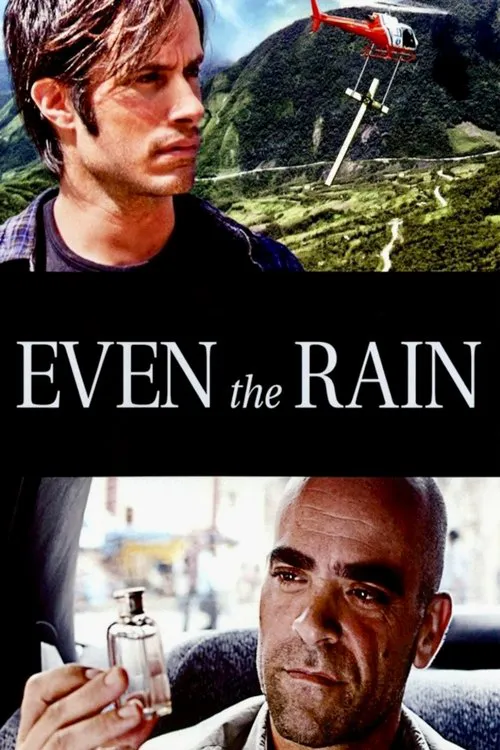Even the Rain

Plot
Even the Rain is a 2010 Spanish drama film directed by Icíar Bollaín. The movie is an interesting blend of drama, social commentary, and filmmaking. It revolves around a Spanish film crew, led by director Sebastian, who arrives in Cochabamba, Bolivia, to shoot a movie about Christopher Columbus, the famous explorer credited with discovering America. The film crew is in Bolivia to shoot "Río," a movie that tells the story of Columbus and his arrival in the New World. However, their primary concern is to capture the scenic beauty of the country on camera. To achieve this, the crew members are in need of a lot of water, which they need to use as a filming prop. But unbeknownst to the crew, their water requirements have a significant impact on the local community. The film delves into the issue that was very real for the Bolivian people during this time. The water privatization controversy was a heated debate throughout Bolivia. In the year 2000, the Bolivian government gave the water supply to a foreign company, in this case, the Bolivian subsidiary of the French multinational corporation Bechtel. As a result of this change in ownership, the people of Cochabamba were required to pay exorbitant rates for water, which quickly spiralled out of control, making it unaffordable for the locals. The film's narrative is interwoven with the story of a group of locals who stage a rebellion against the corrupt government and the water company. They protest the high water prices, the poor quality of the water supply, and the lack of access to this essential resource by the poor. The protesters are led by a passionate young man named Tahuamendi. Sebastian becomes more aware of the reality of the Cochabamba situation and realizes the importance of his film crew's actions on the water supply in Cochabamba. His crew is unaware that their actions are directly impacting the lives of the local population. Sebastian is not just concerned about the impact of his crew's actions, but also the moral implications of making a film that ignores the reality of the local people. As he delves deeper into understanding the plight of the Cochabamba people, he starts to see parallels between their struggles and those of the indigenous people he is portraying in his movie about Columbus's arrival. This film touches on themes of colonialism, oppression, resistance, and the power of art to spark change. On the one hand, the movie delves deep into the complexities of the water privatization crisis, highlighting the impact of globalization on local communities. On the other hand, it explores the potential of filmmaking as a tool for raising awareness about social issues and sparking public discourse. Throughout the film, Sebastian has an epiphany about the story he is trying to tell and its connection to the real-life struggles of the people around him. This turning point changes the approach of his film crew. The film shifts focus from making a conventional movie based on history books to capturing the raw emotion, struggles, and resilience of the people. In this transformation, Sebastian becomes not just a filmmaker, but an advocate for the people. He starts questioning the morality of his project, the water supply in Bolivia, and the film crew's actions that have an impact on this community. With time the crew and the locals develop close bonds and a better understanding of one another. This newfound empathy and understanding allows for the film to become a reflection of the local community's plight. As the filming progresses and the crew experiences first-hand the hardships faced by the locals, they are no longer just shooting a film, but are in reality, taking part in a much bigger story. The film takes an unexpected turn as the local people and the film crew's stories begin to intersect. As the rebellion gains strength, the crew's film becomes a part of the movement, capturing the struggles of the Cochabamba community. Sebastian realizes that the film he is trying to make about Columbus's arrival in America is, in fact, mirroring the real-life struggles of the people he is portraying. The movie ends on a positive note as the crew decides to join forces with the locals to bring attention to their cause. Sebastian realizes the importance of telling the true story of Columbus's arrival as opposed to glorifying the explorer's legacy. This transformation changes the entire perspective of the film, shifting it from a conventional historical drama to a powerful commentary on colonialism, the treatment of indigenous people, and the importance of the human right to access basic resources like water. The crew manages to complete their film, but this time with a message of solidarity with the local resistance. The film becomes a statement against oppression and for the rights of marginalized communities. The film ends with a shot of the people and their message, not just of the film being shot. The film "Even the Rain" sheds light on an important aspect of globalization and colonialism that many films ignore, which is the real human cost to the communities that are affected. It emphasizes the impact of our actions on a broader scale and the ability of film to be a tool for change, rather than a distraction from reality.
Reviews
Recommendations




